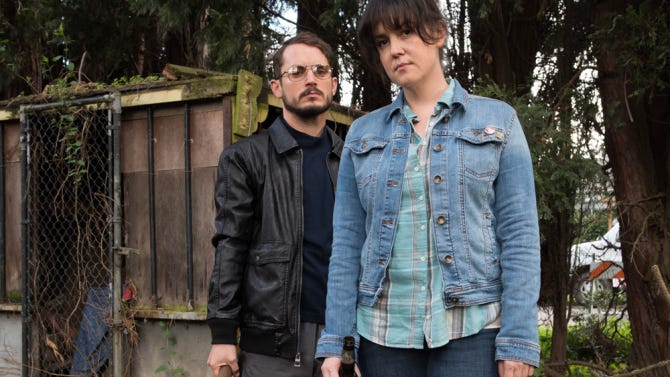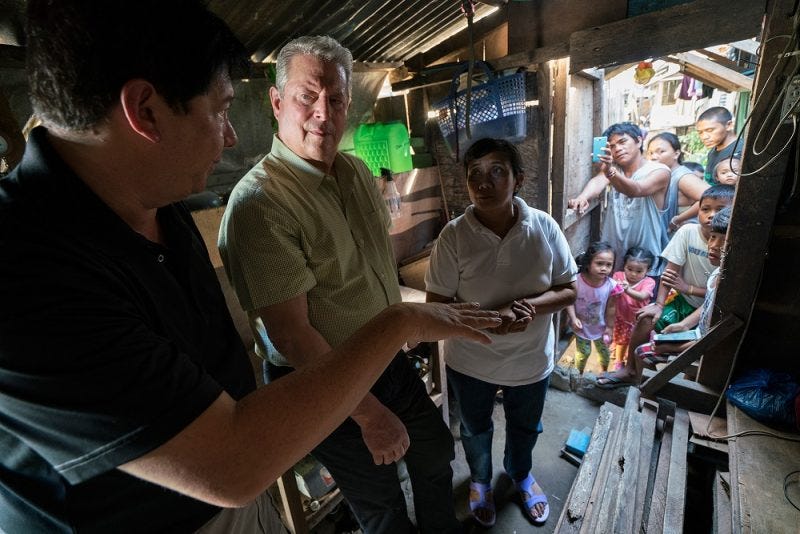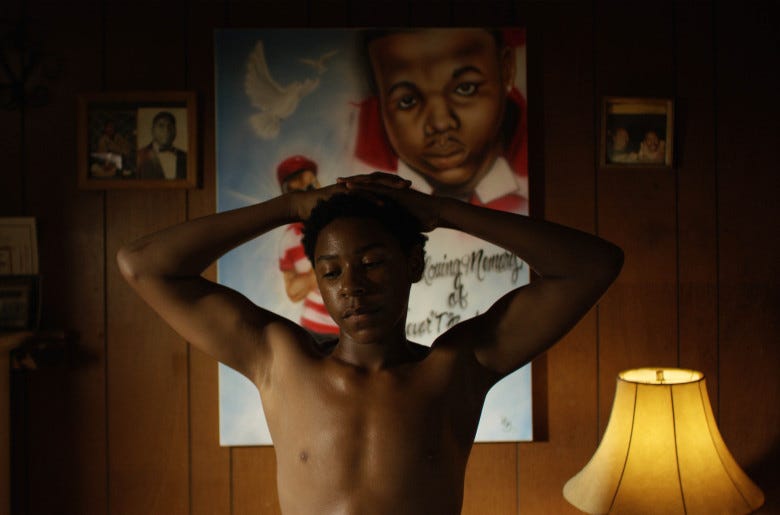2017 Sundance Film Festival Day 1 ‘Inconvenient Sequel’ and ‘Whose Streets?’
Click to read the full story: 2017 Sundance Film Festival Day 1 ‘Inconvenient Sequel’ and ‘Whose Streets?’
The timing for the 2017 Sundance Film Festival couldn’t have been better for Friday’s inauguration of Donald Trump. Even though Robert Redford said they would be steering clear of those topics, the films opening the festival more than speak for that.
WHOSE STREETS?
Directors Sabaah Folayan and Damon Davis balance raw footage of violent protest movements with the intimate, personal struggles of the people behind them to reveal the powerful story of an uprising for racial justice. It’s a movement that began in Ferguson, Missouri, following the 2014 death of Michael Brown, an unarmed black teenager, who was shot multiple times by a white police officer and left lying dead in the street for more than four hours.
Their non-fiction film Whose Streets? premiered to a standing ovation at the Prospector Theater Thursday night in the U.S. Documentary Competition at the 2017 Sundance Film Festival.
When the grand jury failed to indict Darren Wilson for the death of Brown, the movement against the continued police brutality intensified and the National Guard descended on Ferguson with military-grade weaponry. The film is packed with disturbing footage – some recorded by cell phones during the rioting and looting – as the citizens take to the streets to fight for justice. While the mainstream media typically focused on the extreme elements of the protests, such as burning buildings and looting, the directors here are equally unflinching in depicting the unrest – one particularly powerful image depicts an armored tank shooting tear gas grenades at the protestors beneath a street banner that reads “Seasons Greetings.” Folayan and Davis also provide an intimate look at the community members, such as Brittany Farrell, a 25-year-old nursing student and mother of a young daughter, who were forced to emerge as leaders.
During the Q&A that followed their film, Folayan and Davis brought their entire team to the stage, describing their film as “an extremely collaborative project.”
A Ferguson resident who was in the audience relayed how terrifying the protests were and asked how the filmmakers maintained the courage to continue documenting them. Farrell galvanized the crowd by insisting that turning away was not an option for her. “If we don’t do it, who’s going to tell this story?” she asked. “Just imagine all the undocumented stories of communities that are terrorized by the police and are hurting and mourning. What would the world be like if we all got off our asses and did what we have to do for justice and humanity?”
Folayan shared that she intends to continue telling similar stories. “The epidemic isn’t just police brutality,” she insisted. “The epidemic is apathy. The epidemic is the dehumanization of certain people who walk in certain skins and certain bodies. I hope this film can become a tool for people who are already on the ground mobilizing.”

I DON’T FEEL AT HOME IN THIS WORLD ANYMORE
A lot of films are inspired by true-life events – most, even. Yet it’s still a bit surprising to learn that I don’t feel at home in this world anymore. is one of them. The opening night film of the U.S. Dramatic Competition is a giddy maelstrom of a movie – combining elements of thriller, comedy, noir, romance, and small-town indie drama – that spirals deeper and deeper into “I can’t believe that just happened” territory. Yet according to first-time director Macon Blair, the first movements of his script were indeed based on personal experience.
“My apartment got burglarized, and they took a laptop computer and a sentimental no-value item,” Blair said during the post-screening Q&A at the Eccles Theatre. In the film, Melanie Lynskey plays Ruth, a hospital aide who comes home to find her laptop and grandma’s silverware gone. Blair recalled of his experience, “I asked the police, ‘What if I find out where the laptop is?’ And they were like, ‘No man, don’t worry about it.’” But in the movie, Ruth does worry about it, to the tune of recruiting her oddball neighbor, played by Elijah Wood – working kung fu moves and a rattail – to confront a shady lawyer and a band of local thieves, leading to everything from a Mexican standoff to an entanglement with a poisonous swamp snake. “It was a wish-fulfillment scenario of, ‘What if I had followed that down?” Blair said.
According to Lynskey, who returns to the Sundance Film Festival after previous visits for Hello I Must Be Going and Happy Christmas, Blair wasn’t the only one fulfilling a wish. “I think a lot of the time if there’s a woman running and being a badass in a movie, they tend to be a little bit skinnier. I wasn’t on those lists for genre-type movies,” she said. Yet this time, not only was she considered for the role; it was written with her in mind. “When I read the script it was such dream come true. I was like, ‘Are you serious? You want me to do this?’ I didn’t just cry when we wrapped; I cried for the five days leading up to wrap. I never wanted it to end.”
Other members of the cast expressed similar sentiments, with David Yow revealing that seven members of the cast and crew commemorated their time together by getting matching cat tattoos like the one worn by his seedy crook, Marshall. “That’s conviction and love,” he said. Strong attachments were also forged with the run-down car that Ruth drives, a vintage 1970s Pontiac that harkened back to the director’s first ride. They’d originally cast that very same model, a ’76 Pontiac Ventura, painted pine green to match his memory, but that car died on the first day of shooting. The replacement vehicle was apparently warmly welcomed into the fold by the film’s star. “Melanie just loved that car. She loved parking it and driving it,” Blair said, and Lynskey picked it up from there. “I loved shutting the door because it was so easy and smooth,” she cooed. “I loved being in it, smelling all the fumes.

AN INCONVENIENT SEQUEL
Leave it to Al Gore to discredit the show business adage that sequels are rarely as good as the originals. Eleven years after his aptly titled An Inconvenient Truth put the issue of global warming on the cultural map, the former Vice President and environmental activist returns with An Inconvenient Sequel: Truth to Power, an unfortunately necessary follow-up to the Academy Award-winning first film, which remains one of the highest-grossing documentaries on record.
The documentary, with wife-and-husband team Bonni Cohen and Jon Shenk effectively taking over directorial reigns from Davis Guggenheim, premiered in the prestigious opening night spot at the Eccles Theatre Thursday night as part of The New Climate, a program dedicated to conversations and films about environmental change and conservation.
During his opening remarks, Festival president and founder Robert Redford informed the audience that he and Gore are very close friends, having worked together numerous times in the past. “Being out of politics and going into film allows him to work both sides of the street,” Redford noted. “He has done it beautifully.” Watching the film, few were able to argue with that assessment.
Following Redford’s comments, Festival Director John Cooper, without directly acknowledging the January 20 inauguration, told the audience that the night before was the perfect time to watch this film. As he called the directors to the stage, Cohen noted that on the eve of the inauguration of a president who has publicly described climate control as a hoax created “by the Chinese,” this documentary takes on added importance.
If ever a non-fiction film could be accused to playing to the choir, it’s probably this one. The doc opens with vocal criticism of Gore’s awareness campaign over heartbreaking footage of melting glaciers. Throughout, Gore clearly aims to clarify that global warming is not a partisan issue. He meets with the mayor of Georgetown, Texas, who has almost miraculously gotten his city to 100% renewable power. The film also offers a not-frequently seen look into political deal-making. Gore travels to Paris for a political gathering to sign a treaty, which would call for a net zero climate pollution by the end of the century. The talks are interrupted by the terrorist attack on the city.
While the film depicts a future that is unclear, Gore insisted on leaving the premiere audience with a positive thought. After the credits rolled Gore was called to the stage, where he insisted that environmentalists like him will prevail. “I won’t give all the evidence of why I’m so confident, but I am,” Gore told the Eccles audience. “For those who have any doubt, just remember there are so many others who are yearning to do the right thing and see the right outcome.”
He went on to call the movement against global warming a moral issue. “It’s a spiritual issue,” he said. “Are we a pathetic, self-interested, short-sided species whose run on the planet will soon be over?” Sounding incredibly presidential, Gore added that we have the ability to rise above our limitations. “No one person can stop this,” he said referencing President Trump, “It’s too big now.”

DAYVEON
The first film in the NEXT category to ever screen on opening night of the Festival, Dayveon is an evocative, closely observed portrait of a young man who gets pulled into gang activity in Little Rock, Arkansas. After the premiere at the MARC, debut filmmaker Amman Abbasi appeared alongside his cast to talk about the germination of the project.
“I used to work in documentary, and we were working on a project on gang violence in Chicago. I spent about two years there, and as I was talking to young kids and hearing about their stories,” he said, “I started thinking, ‘Why don’t I look at Little Rock, which is my hometown?’” Abbasi said that despite the disparity in city size, he was struck by the similarities of what young people have to confront, and he began to work on a script that would “look at gangs not as a criminal organization but as a form of acceptance for someone in adolescence.” Violence lurks around every corner in the film, but it’s also not hard to see why the protagonist, Dayveon, who’s still mourning the death of his older brother, would find a kind of kinship among young men taking power into their own hands.
The actors, all nonprofessionals prior to Dayveon, talked about the unusual circumstances and locations where they were recruited for the project, thanks to venturesome casting directors John Williams and Karmen Leech. Lead actor Devin Blackmon was found from among a search throughout the neighboring states, and he said his initial readings for the part were held at the local Starbucks. Chasity Moore, who plays Dayveon’s older sister, said she was looking up job listings on Craigslist when she saw the casting call. Kordell Johnson, who plays her boyfriend, said he was spotted at the Olive Garden. “She was just looking at me when I was picking up my food,” he said, referring to Leech. “I’m just a guy from a small town in Little Rock, Arkansas. I never shot a movie, and I never did drama. So I’m not taking it very seriously. But she hit me the next day on email and told me I had a meeting with Amman at McDonald’s.”
And Lachion Buckingham, who also served as a producer on the film, was working as a driver at a hotel in Little Rock when he got linked up with the film. “Unlike the person on the TV, I’m a good guy,” he reassured the audience. Buckingham talked about his own brother who was paralyzed by gun violence, and the people he knew, some of whom are imprisoned or dead, who dealt with similar pressures and outcomes as the characters in the film. “I put a lot of the people I knew growing up into one to create the character,” he said.
Abbasi said they workshopped the script for three months before shooting, which allowed for improvisation on set. He also said that some of the characters evolved based on the actors, particularly Dayveon. “He brought a certain introspection to the role that I hadn’t previously thought of,” he said, referring to Devin. “So it took me a while to let that guide the character.” Abbasi also tailored the film’s score, which he composed, to the development of the characters. “With a film like this, it’s not so much the dialogue but the emotion of these characters” that leads us through, he said, “and obviously music is a great vessel in.”
There were questions from the audience about some of the mysterious, metaphorical choices of the film, such as a swarm of bees that looms just outside of Davyeon’s house, as well as the lack of actual depicted violence, but Abbasi reassured them that was entirely by design. “I think … the things that you don’t see sometimes leave a longer impression,” he said.
The post 2017 Sundance Film Festival Day 1 ‘Inconvenient Sequel’ and ‘Whose Streets?’ appeared first on Movie TV Tech Geeks News By: MTTG Staff
